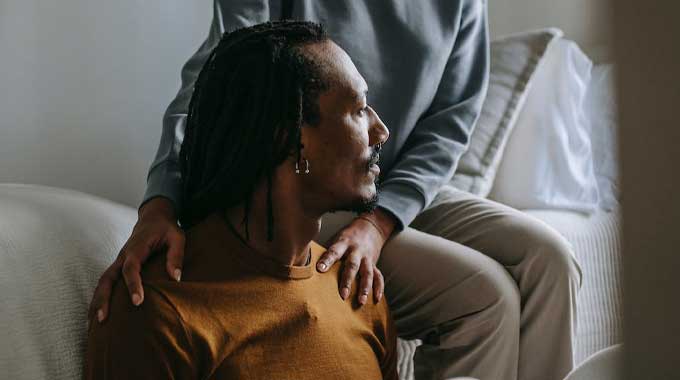It is commonly known that alcohol consumption can be harmful to the heart. However, it is essential to know that people can also experience chest pain and heart problems when withdrawing from alcohol.
What Is Alcohol Withdrawal Syndrome?
Alcohol withdrawal syndrome occurs when a person with an alcohol use disorder (AUD) suddenly reduces their alcohol consumption or stops drinking. When this happens, the body experiences withdrawal symptoms that can vary from mild to severe and even be life-threatening in some extreme cases. Although this is true, the severity of the symptoms depends on the individual, their alcohol addiction, and their general health and well-being.
If someone is a heavy drinker, their central nervous system will have adjusted to having large amounts of alcohol in its system. This is because drinking alcohol increases gamma-aminobutyric acid (GABA) levels in the brain. As a result, when they quit drinking, a lack of GABA triggers a number of withdrawal symptoms.
Alcohol Withdrawal Symptoms
The severity of alcohol withdrawal symptoms is dependent on the individual. However, they have been found to peak within the first twenty-four to forty-eight hours after a person stops drinking.
Some common symptoms of the withdrawal phase are:
- Mild symptoms (experienced six to eight hours after the last drink) – Headaches, anxiety, nausea, vomiting, and mood swings.
- Moderate symptoms (experienced twelve to forty-eight hours after the last drink) – High blood pressure, fever, confusion, and irregular heartbeat.
- Severe symptoms (experienced forty-eight to seventy-two hours after the last drink) – Fever, seizures, and hallucinations.
- Delirium tremens: This is the most severe type of withdrawal symptom. Presenting as delusions, hallucinations, chest pains, uncontrolled muscle spasms, seizures, rapid heartbeat, and sensitivity to light and sounds, delirium tremens is induced by an altered mental state and autonomic hyperactivity.
Alcohol withdrawal symptoms typically reduce after one or two weeks, but symptoms may last longer depending on the person. Usually, the severity and duration are influenced by factors such as substance abuse, frequency of drinking, and the amount drunk.
For those who participate in chronic alcohol use, severe withdrawal symptoms may be experienced.
Related article: recovery group topics
Acute Alcohol Withdrawal
When a person stops drinking, they will likely experience acute alcohol withdrawal in the following days. This refers to the withdrawal symptoms listed above.
Throughout this period, people are at risk of:
- Loss of consciousness
- Delirium tremens
- Seizures
As there is a significant risk of experiencing the life-threatening symptoms noted above, individuals looking to recover and stop drinking are advised to seek professional medical advice.
Chest Pain and Severe Withdrawal Symptoms
When individuals begin to withdraw from alcohol, they may experience chest pains and find themselves at risk of certain heart complications. Irregular heartbeats, artery spasms, and sudden cardiac death are all potential problems that can arise when experiencing alcohol withdrawal.
Tachycardia
In simpler forms, tachycardia means a fast heart rate. A rapid heartbeat is a common symptom of alcohol withdrawal and occurs because of the change in chemicals in the brain.
This particular medical condition presents itself in the form of:
- Heart palpitations
- Chest tightness
- Dizziness
- Difficulty breathing
This condition is caused by atrial fibrillation, which arises when the heart receives irregular electrical impulses. As alcohol affects the central nervous system, the body will overreact when alcohol is no longer present, causing the heart rate to increase.
Arrhythmia
Arrhythmia causes people to experience irregular heartbeats. When encountered, those withdrawing from alcohol may feel like their heart is beating too slowly or too quickly.
Typically this symptom is experienced by chronic drinkers who consume large amounts of alcohol in one sitting. This is often nicknamed holiday heart syndrome and is found to go away on its own.
Coronary Artery Spasms
Coronary artery spasms occur when one of the blood vessels leading to the heart constricts or narrows. Research has found that alcohol can cause spasms in the heart’s arteries.
When this happens, it may result from the blood not flowing smoothly to the rest of the body and is potentially dangerous. It could even cause a heart attack, so healthcare providers need to quickly respond and deal with the issue if a person experiences this pain.
Alcoholic Cardiomyopathy
In heavy drinkers, alcohol consumption can cause the heart muscle to wear down over time, resulting in alcoholic cardiomyopathy, also known as heart disease.
Unfortunately, alcoholic cardiomyopathy worsens as a person drinks more. In worse case scenarios, it can lead to heart failure, which results in death. However, if a person stops drinking alcohol permanently, the effects of the condition can be reversed.
Cardiac Death
People with alcohol addiction are at greater risk of sudden death and cardiac arrest than the rest of the population.
Many of the chest pains listed above are also linked to sudden death. However, more research is needed to better understand the relationship between alcohol abuse and sudden cardiac death.
Alcohol Withdrawal Treatment
When an individual is affected by alcohol dependence, they will likely experience symptoms of alcohol withdrawal. Although sometimes painful, many addiction treatment facilities and addiction treatment options are available to help anyone struggling overcome their drinking problems.
Many people will choose to self-detox and progress through withdrawal in their home environment. However, this is not recommended for those who are experiencing severe symptoms.
Should alcohol withdrawal treatment at an inpatient rehab be taken advantage of, medical professionals can offer assistance to anyone experiencing symptoms of alcohol withdrawal. Medical help can also provide support throughout the whole process.
Recovery programs can range from:
- Inpatient treatment – This is the most intensive type of treatment and is advised for those with an alcohol addiction. Here, twenty-four-hour care in a supervised environment is provided.
- Outpatient treatment – Outpatient rehab is recommended for less severe forms of alcohol abuse disorder. During outpatient treatment, the individual still lives in their home and can complete daily responsibilities while undergoing treatment.
- Support groups – Support groups are used after treatment to help provide motivation. They offer an outlet for those in recovery to discuss experiences with others on the same journey.
- Individual counseling – Alcohol rehab counselors can provide support when a person experiences alcohol withdrawal. They can also establish any influential factors towards an individual’s addiction and teach clients how to work through these issues.
Alcohol withdrawal symptoms can be evident in the body as early as two hours after someone’s last drink. For this reason, medical detox is recommended over self-detoxing at home.
Furthermore, when medical detox is completed, healthcare professionals can prescribe medications for pain and recommend treatment for any additional side effects. For example, benzodiazepines are commonly prescribed to treat symptoms of alcohol withdrawal, such as anxiety, insomnia, or shaking.
Return to the homepage: Rehab in Orange County
In a medical environment, those in recovery may be prescribed anti-seizure medication or antipsychotics to help reduce the effects of mental health disorders if they are required. Another benefit of medical detox is that those in recovery will be in an encouraging environment during the most challenging days of alcohol withdrawal.
To Conclude
If someone is withdrawing from alcohol at home and experiences chest pain, they may be experiencing the dangerous side effects of alcohol withdrawal. In this instance, immediate help must be sought from licensed medical professionals.
Alcohol withdrawal can be dangerous and painful, but it is essential for recovery.






